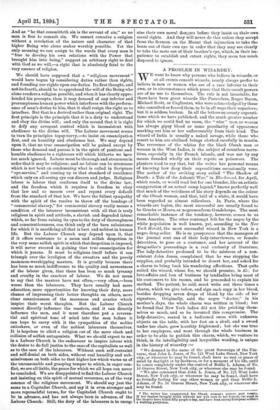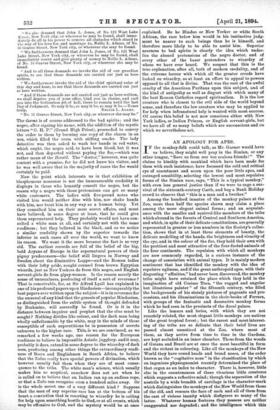A PROBLEM IN WIZARDRY.
WE want to know why persons who believe in wizards, or at all events consult wizards, nearly always prefer to believe in men or women who are of a race inferior to their
own, or in circumstances which prove that their occult powers are of no use to themselves. The rule is not invariable, for there have been great wizards like Paracelsns, Roger Bacon, Michael Scott, or Cagliostro, who were acknowledged by those who consulted or feared them, to be in all ways their superiors; but it is seldom broken. In all the letters on county supersti- tions which we have published, and the much greater number for which we could find no room, the " wise " man or woman has always gipsy blood or some peculiarity of appearance marking out him or her unfavourably from their kind. The wizard of India is usually a naked savage, while those who resort to him are civilised beings clothed carefully in muslin.
The reverence of the whites for the black Obeah man or woman in the West Indies, is the subject of countless narra- tives, especially in the French islands, and was not by any means founded wholly on their repute as poisoners. The planters used to say that, but the writer has personal means of knowing how deep their superstitions occasionally were. The author of the striking story called "The Shadow of
Death: a Tale of the Ashanti War," in Blackwood, for April, which reads, or would read but for one blunder, like an artistic exaggeration of an actual camp legend,* knows perfectly well that much of the weirdness of his story depends on the colour of the Obeah woman, and that, told of a white, it would have
been regarded as almost ridiculous. In Paris, where the wizards are legion, the most successful are usually found to be Greeks or Moors, or negressesfrom Guadeloupe. The most remarkable instance of the tendency, however, comes to us
from America. The utter contempt felt for the negro by the white population is well known, yet, according to the New York Herald, the most successful wizard in New York is a
negro drag-seller. He is so prosperous that the managers of the journal sent one of their lady-interviewers, or female- detectives, to pose as a customer, and her account of the drug-seller's proceedings is a real curiosity of literature.
The lady-detective professed to be the mistress of a non- existent John Jones, complained that he was stopping the supplies, and probably intended to desert her, and asked for a charm to bring back his wandering affections. That quite suited the wizard, whose fee, we should premise, is £5; for love-affairs and loss of business by landladies bring most of his customers to his rooms, and he proceeded to explain his method. The patient, he said, must write out three times a charm, which we give below, and sign each copy in her blood, besides dropping seven drops of blood by the aide of her signature. Originally, said the negro "doctor," in his mother's days, the whole charm was written in blood; but he found that New York ladies did not like pricking them- selves so much, and so he invented this compromise. The lady-detective, seated in a bedizened room with unknown objects on the table, with her feet on a skull, and a sword under her chair, grew horribly frightened ; but she was true to her employers, and went through the whole business in order to be able to publish this charm, which, we venture to think, in its intelligibility and lawyerlike wording, is unique in the history of wizardry :—
"We demand in the name of the great Sovereign of the Uni- verse, that John L. Jones, of No. 121 "West Lake Street, New York city, or wherever he may be found, shall have no rest or peace of mind by daylight or by darkness, or for a moment of his life, until he comes completely under the control of Nellie L. Adams, of No. 16 Graves Street, New York city, or wherever she may be found.
"We also command that John L. Jones, of No. 121 West Lake Street, New York city, or wherever he may be found, shall have no friendly feeling for any other woman or girl than Nellie L. Adams, of No. 16 Graves Street, New York city, or wherever she may be found.
• The writer has exaggerated his Obeah woman's powers past reason. If her shadow brought death without her will even to her friends, she must in the tropics have killed fifty people a day, and have been among European soldiers a walking pestilence.
" We also demand that John L. Jones, of No. 121 West Lake Street, New York city, or wherever he may be found, shall imme- diately do all in his power to remove all obstacles which stand in the way of his love for, and marriage to, Nellie L. Adams, of No. 16 Graves Street, New York city, or wherever she may be found. " We furthermore demand that John L. Jones, of No. 121 West Lake Street, New York city, or wherever he may be found, shall immediately marry and give plenty of money to Nellie L. Adams, of No. 16 Graves Street, New York city, or wherever she may be found.
"And to all these demands we invoke the aid of our guardian spirits, to see that these demands are carried out just as here written.
"We furthermore invoke the aid of the chief spiritual ruler of this day and hour, to see that these demands are carried out just as here written.
"And if these demands are not carried out just as here written, we shall deprive you of your office, bind you in chains, and cast you into the bottomless pit of hell, there to remain until the last Day of Judgment. So may it be, so may it be, so may it be.—Yours
truly, NELLIE L. ADA M8. "No. 1C Graves Street, New York city, or wherever she may be."
The threat is of course addressed to the bad spirits; and the negro, after signing his name, with the addition of the mystic
letters "G. H. P." (Grand High Priest), proceeded to convey the order to them by burning one copy of the charm in an urn, which filled the room with stifling smoke. The lady detective was then asked to wash her hands in red water, which ought, the negro said, to have been blood, but it was not, and then departed without paying the fee,—which was rather mean of the Herald. The "doctor," however, was quite
content with a promise, for he did not know his visitor, and he was well aware that in the majority of cases the fee would certainly be paid.
Now the point which interests us in that exhibition of blasphemous nonsense is not the immeasurable credulity it displays in those who honestly consult the negro, but the reason why a negro with those pretensions can get so many white customers. The ladies with five-pound notes who visited him would neither dine with him, nor shake hands with him, nor treat him in any way as a human being. Yet they consulted him on their most secret affairs, and must have believed, in some degree at least, that he could give them supernatural help. They probably would not have con- sulted a white man at all, and certainly not with the same readiness ; but they believed in the black, and as we notice a similar credulity shown by the superior towards the inferior in such cases all over the world, we want to know its reason. We want it the more because the fact is so very old. The earliest records are fall of the belief of the big, bold Aryans of Europe in the supernatural powers of their pigmy predecessors—the belief still lingers in Norway and Sweden about the diminutive Lapps—and the Roman ladies with their lofty pride, sought counsel from brown Egyptian wizards, just as New Yorkers do from this negro, and English servant-girls do from gipsy-women. Is the reason merely the sense of unusualness, producing of itself a sort of reverence ?
That is conceivable, for, as Sir Alfred Lyall has explained in one of his profound papers upon Hindooism—incomparably the best papers ever written upon the subject—it is in reverence for the unusual of any kind that the genesis of popular Hindooism, as distinguished from the subtle system of thought defended by Brahmins, will assuredly be found. Or is it in the • distance between inquirer and prophet that the clue must be sought P Nothing divides like colour, and the dark man being wholly unfathomable by the white, may in the minds of those susceptible of such superstitions be in possession of secrets unknown to the higher race. This, is we are convinced, as we remarked a few weeks ago, one reason for the European readiness to believe in impossible Asiatic jugglery, and it may, probably it does, extend in some degree to the wizardry of dark men, producing among other things the extraordinary readi- ness of Boers and Englishmen in South Africa, to believe that the Zulus really have special powers of divination, which however usually fail them when they are of most conse- quence to the tribe. The white man's science, which usnally makes him so sceptical, somehow does not act when he , is called on to believe that an Indian ran up an endless rope, or that a Zulu can recognise oxen a hundred miles away. Or ' is the whole secret one of a very different kind ? Suppose
that the man of any superior race has at the bottom of his heart.a conviction that in resorting to wizardry he is calling for help upon something hostile to God, or at all events, which may be offensive to God, and the mystery would be at once explained. Be he Hindoo or New Yorker or white South African, the race below him would in his instinctive judg- ment be nearer to such beings than he is himself, and therefore more likely to be able to assist him. Superior nearness to bad spirits is clearly the idea which under- lies the absurd pretensions of the negro doctor, and of every other of the baser pretenders to wizardry of whom we have ever heard. We suspect that this is the true explanation, after all, both of modern credulity, and of the extreme horror with which all the greater creeds have looked on wizardry, as at least an effort to appeal to powers opposed to all that is divine. That was the root of the awful cruelty of the American Puritans upon this subject, and of the kind of antipathy as well as disgust with which many of the best Roman Catholics regard spiritualism. It is the low creature who is closest to the evil side of the world beyond sense, and therefore the low creature who may be applied to for help when infranatural help is wanted with most success. Of course this belief is not now conscious either with New York ladies, or Indian Princes, or English servant-girls, but we have all of us many beliefs which are unconscious and on which we nevertheless act.



































 Previous page
Previous page